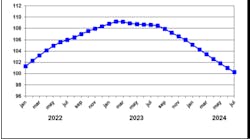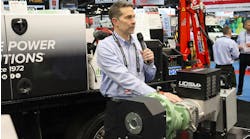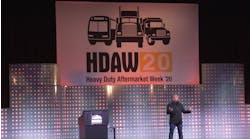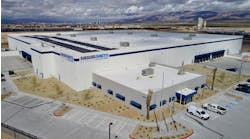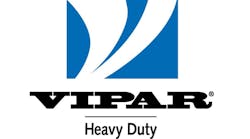San Antonio Equipment Distributors Tell Congress: Get to Work on the Highway Bill So WE Can Get Back to Work!
Congress' failure to renew the federal highway program has real economic consequences throughout the United States, construction equipment industry leaders said at a rally today at the Henry B. Gonzalez Convention Center.
The event was part of a national grassroots campaign called Start Us Up USA! by Associated Equipment Distributors (AED) and the Association of Equipment Manufacturers (AEM), the nation's two leading equipment industry trade groups.
Following the rally, a caravan of trucks carrying large pieces of construction equipment idled by the industry depression and draped with banners made its way through the streets of downtown San Antonio.
AED and AEM are seeking to draw attention to the economic crisis facing construction equipment distributors and manufacturers, as well as the consequences of Congress' failure to reauthorize federal highway and transit programs. According to a recent study by IHS Global Insight, since 2006 the U.S. equipment industry has lost 37% of its workforce and 40% of its economic output. All indications are that construction industry business conditions are getting worse and what is happening -- or is not happening -- in Washington, D.C., is only adding to the misery.
SAFETEA-LU, the most recent federal surface transportation law, expired at the end of September. Distracted by health care reform and climate change legislation, neither the U.S. House of Representatives nor the Senate has made headway on a reauthorization bill. As a consequence, the highway program is operating under a series of short-term extensions that have added to historic volatility in the construction markets.
"States can't plan and contractors don't know how much work will be coming down the pike," AED President & CEO Toby Mack said. "As a result, they're sitting on their hands and not investing in new equipment. That's killing our industry."
"We're not asking for a handout like the ones Congress gave the auto industry or the financial services sector," AEM President Dennis Slater said. "We're just asking Congress to do its job and make highway reauthorization a priority."
Bennett Closner, president and CEO of Closner Equipment Co., Inc., a San Antonio dealer, provided a local perspective on the national crisis. Closner, who is the 2009 national chairman of AED, said that since 2006 Texas has lost more than $11 billion in economic activity because of the equipment industry downturn, the biggest loss of any state. And Texas is second only to California in equipment industry-related job losses, with more than 53,000 layoffs in three years.
"I've listened to friends and colleagues agonize over the difficult decisions they've had to make about their businesses. Almost all have had to lay off valued workers, many have closed one or more of their facilities, and some companies have shut their doors altogether after several generations in business," Closner said.
Peter M. Holt, CEO of San Antonio-based Holt CAT, told rally attendees that local equipment dealers have experienced a 70% drop in new machine sales from 2008 levels. He said that the most debilitating impact of the downturn for his company has been a 25% reduction in employment.
"Our remaining employees have made sacrifices in pay and benefits to enable us to stay profitable, and plans for several new store locations were canceled," Holt said.
According to Holt, the economic crisis and uncertainty surrounding the highway bill are also taking a massive toll on local contractors. "Our customers who do highway construction have laid off thousands of employees. Many contractors are still reducing their workforces and their equipment fleets. The rapid drop in value of used equipment has also had a drastic affect on the equity of most contractors, resulting in a reduction of both borrowing and bonding capacity," he said.
Other speakers at the rally included Texas State Senator Jeff Wentworth (R-District 25); Dean Word, III of Dean Word Company (New Braunfels); and Craig Paylor, president of JLG Industries, a manufacturer of mobile aerial work platforms based in Maryland. They pointed to the broad social and economic consequences of infrastructure investment, or rather Congress' failure to invest enough.
According to the Texas Transportation Institute (TTI), traffic congestion costs the country $87 billion per year in wasted time and fuel. TTI reports that, on average, San Antonio commuters waste 27 gallons of fuel and 38 hours per year sitting in traffic. A study last year by the Transportation Construction Coalition found that road conditions are a contributing factor in more than half -- 52.7%-- of the nearly 42,000 American deaths resulting from motor vehicle crashes each year. Accidents in which road conditions were a factor cost Texas more than $13 billion in 2006.
More information about highway reauthorization and the AED-AEM campaign is available at www.startusupusa.com.
